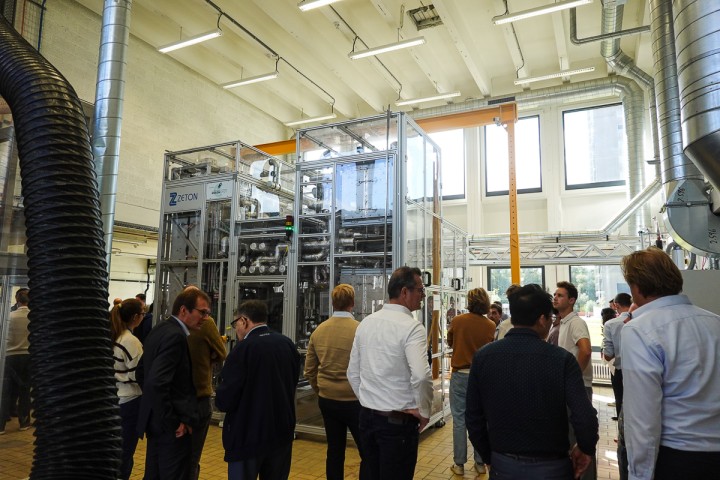“The transition to a circular economy and addressing climate change are opportunities for growth and innovation”
Researchers at the University of Ghent have reached a significant milestone in CO2 recycling, with the successful scale-up of a groundbreaking process. The super-dry reforming (SDR) pilot plant was unveiled to the public, showcasing the potential for large-scale impact on reducing carbon emissions. Tine Schaerlaekens, director of Catalisti, spoke at the event, highlighting the role of the Moonshot program in bridging innovation roadblocks. Here is her full speech from the opening ceremony.

Good afternoon,
It’s a privilege to stand here today to introduce the SDR pilot installation, a project that embodies the very essence of innovation and climate action we are striving for in Flanders. This pilot, supported by our Moonshot program, is a remarkable example of how collaboration between research institutes, industry, and government can lead to breakthrough technologies that help us tackle climate change.
The Importance and Challenge of Moonshot
Back in March 2019, the Flemish Minister for Economy and Innovation launched the Flanders Industry Innovation Moonshot program. This ambitious initiative, supported by a substantial €400 million investment, focuses on transforming the energy-intensive sectors of our economy, especially in chemical, petrochemical, and steel industries, to meet the challenges posed by climate change.
The Moonshot program, hosted by Catalisti from the outset, is a long-term commitment to innovation. With a steady investment of €20 million annually for 20 years, we are challenging research to deliver breakthrough technologies that can significantly reduce CO2 emissions, enhance CO2 capture, or improve carbon circularity.
The goal is clear: fully rethink and transform our processes to reduce net emissions. Whether through carbon capture utilization and storage (CCUS), utilizing renewable feedstocks, or closing the loop by developing new recycling technologies, these efforts are essential in building a carbon-neutral economy by 2050.
Yet, none of this can happen without addressing another critical piece of the puzzle – affordable, low carbon energy. Achieving electrification, energy efficiency, and transitioning to sustainable energy sources are all challenges that must be overcome. In short, we need innovations not just in materials and processes, but also in energy.
The Role of LSI Projects in Moonshot
Within the Moonshot program, we focus on more than only early-stage research. We also support Later Stage Innovation, or LSI projects, like the SDR pilot being opened here today.
Flanders is home to world-class universities and research organisations with a strong record in fundamental and applied research. However, taking groundbreaking research from the lab to the market is a long and challenging journey. Especially in the chemical sector, it can take more than 10 years to move from a breakthrough in basic research to demonstrating a technology at an industrial scale.
Turning an idea into a commercial product often involves three key stages: scientific & technological research, upscaling and demonstration, and competitive manufacturing. It is often in that second stage—upscaling and demonstration—where promising innovations hit a roadblock.
This is where the Moonshot program steps in. LSI projects like SDR bridge the gap between research and commercialization by providing the necessary support for experimental upscaling and demonstration. This phase is critical because it allows researchers to test process parameters at a relevant scale and produce sufficient quantities for industrial testing. This is a crucial step before the technology can be adopted by industry.
For many research organizations, the pilot and demonstration phases require significant investment, while the potential benefits of the technology may still be uncertain. The risk is high, and this often slows progress. The Moonshot program addresses this challenge by reducing the risks associated with later-stage innovation, accelerating the path to market for technologies that can make a significant impact on carbon reduction and circularity.
A Call to Action
In addition to supporting projects like SDR, we believe it is also vital to support pilot and demonstration projects of companies, from start-ups to multinationals. This is needed to further bridge the gap between research & commercialization.
I hope that this message resonates with our government partners, as it will be an important tool in shaping a transformative innovation policy—one that has real, tangible impacts on the energy & climate transition.
Catalisti is here to help
At Catalisti, we are proud to play a key role in these developments. Our work sits at the intersection of economic competitiveness and societal challenges. The transition to a circular economy and addressing climate change are not only environmental imperatives, but also opportunities for growth and innovation.
With Moonshot, we have a unique opportunity to combine technological breakthroughs with real-world impact. By supporting projects like the SDR pilot, we are not only tackling climate challenges but also ensuring that Flanders remains a leading region for industrial innovation.
The SDR pilot, developed by the University of Ghent, is an excellent example of this. The super-dry reforming of CO2—technology being tested right here—has already shown promising results. We are proud to have supported this project through the Moonshot program, and I am confident that it will pave the way for further advancements.
Let's stay committed
As we explore the SDR pilot installation today, let’s celebrate the achievement, and let’s stay committed to supporting many more such projects in the years to come. Catalisti will continue to play its part in making Flanders a leader in innovation while addressing pressing challenges of our time. Thank you, and I look forward to seeing the great work being done here.